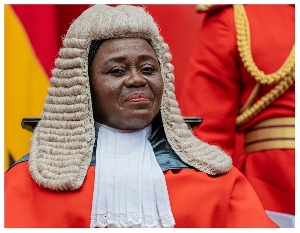 Chief Justice Gertrude Torkornoo
Chief Justice Gertrude Torkornoo
Justice Gertrude Torkonoo assumed office on July 12, 2023, as Ghana’s fifteenth Chief Justice, and has since been leading significant reforms in the country’s judicial system.
As the third woman to occupy the office of Chief Justice, she holds the fourth highest position in the country and is at the top of the judicial hierarchy, serving as an administrator and supervisor.
Since her assumption of office, she has implemented some reforms aimed at enhancing the delivery of justice and legal education in the country.
GhanaWeb reviews some of the key reforms introduced under her leadership to improve justice delivery in the country.
Small claims and debt recovery courts.
On August 7, 2024, the Chief Justice, Justice Gertrude Sackey Torkornoo, commissioned a court dedicated to small claims and debts recovery.
The move aims to address the resolution of financial disputes, credit recovery cases, and claims from other institutions.
It is expected to hear more than 50,000 cases that Bills Micro-Credit Limited, formerly Quick Credit, has begun filing to recover their funds.
At the commissioning of the courts, the Chief Justice expressed hope that the move will help deal with the increase in the caseload of small claims filed by Bills Micro-Credit Limited .
“It is our expectation that with the launch of these Small Claims Debt Recovery Courts and cooperation of citizens, and the businesses involved, the nation can confront head-on and in a speedy manner, the challenge of the nearly 55,000 claims that Bills Micro-Credit Limited alone has expressed the intention of filing in the Lower Courts,” she said.
Automation of Courts
Some one hundred and sixteen (116) courts have been automated across the country, bringing the total number to 228.
The automation aims to provide efficient and effective recording of court proceedings.
The e-justice system (also called Paperless Courts) is part of the government’s e-Transform Programme, which seeks to automate the existing manual filing systems within the Court’s Registry.
The Director of ICT at the Judicial Service, Noble Kekeli Nutifafa, speaking at the third edition of the Chief Justice’s Meeting with the Judicial Press Corps (JPC) on August 3, 2024, said 71,781 cases had been filed as part of the e-justice system initiated by the Judicial Service as of July 2024.
He said the service has also developed an e-bail tracking system used by the courts to check documents used for sureties.
“It is also used to keep track of the inflow and outflow of documents deposited at the registries,” he added.
He said other upcoming initiatives included e-signature/digital signature, court alert and notification systems, national transcription centers, an electronic case management system, a digitalized land database, and a speech-to-text mechanism.
Software for Independent Examination Committee of the General Legal Council
Under her leadership, a new software for the Independent Examination Committee (IEC) of the General Legal Council (GLC), the body mandated to conduct examinations for professional law students and admission to the Ghana School of Law, was launched on July 12, 2024.
The Chief Justice described the initiative as great news for legal education in the country.
“I am grateful that finally, we have in place a software for the administration of examinations of professional legal education in the country to be used by the Independent Examinations Committee of the General Legal Council (GLC)," Justice Torkornoo said.
Courts to Have Shift Systems
On March 16, 2024, the judicial service introduced a court shift system to help clear the backlog of pending cases across the country.
A statement issued by the Judicial Secretary, Pamela Koranteng, said the Chief Justice has introduced a Court Shift System on a pilot basis by optimising the use of existing court resources to reduce the volume of cases before the Courts, effective March 25, 2024.
“The rational for the Court Shift System stems from the fact that, findings from a physical count of dockets undertaken in all courts nationwide demonstrated that a number of identified courts have huge caseloads, with some in excess of 600 pending cases,” it noted.
JKB/AE
Watch the latest episode of Everyday People on GhanaWeb TV below: